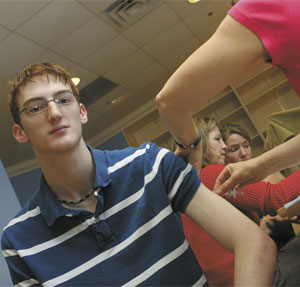 |
| HIT ME WITH YOUR BEST SHOT: Needle-hater James Harris tries not to look. (Nick Pearce Photo) |
Kristyn MacMillan glances down at her arm where the needle went in and resists the urge to rub it.
“Ten seconds of pain and we’re all good,” she says nonchalantly, describing the needle as a “burning pinch.”
As clinics opened on campus, the 18-year-old from Kentville, N.S., made sure to make the trip part of her routine for the day. Ever since she arrived at university, the message has been driven home — students need to get a second measles/mumps/rubella vaccine in addition to the one they got as toddlers.
“It was in frosh kits, you see it on posters everywhere, and they even tell us about it before lectures,” she says.
The mumps suck. That’s the frank message HÂţ» is sending students as it launches a vaccination program designed to prevent a mumps escalation on campus.
In cooperation with Health Services and the provincial Department of Health, the university is offering a voluntary MMR vaccination program as students arrive on campus for the fall term.
Students can roll back their sleeves for free vaccinations at clinics running until Thursday, Sept. 20 at the Student Union Building. The vaccine is accessible to all Nova Scotians attending a university or college (both within and outside the province) as well as to all students from outside of Nova Scotia attending school here.
“I woke up, I heard about it and I came over,” says James Harris, a first-year King’s student. “I just don’t want to get the mumps. It sounds miserable.”
Working with the HÂţ» Student Union, the university has also launched an information program to spread the word about the vaccine and how to avoid contracting the mumps. Information was presented on the Dal and DSU web sites, on USB ports in frosh kits, through articles on Dal News online, and a poster campaign.
Nova Scotia health officials have been managing a mumps outbreak since last February. There have been at least 690 cases reported in nine provinces, but the lion’s share — more than 540 — have occurred in Nova Scotia. Since the beginning of the academic year, there has been one confirmed case of mumps at HÂţ».
The outbreak mainly affected students between the ages of 19 and 24, who received only a single dose of MMR as babies. The National Advisory Committee on Immunization (NACI) recommends offering a second dose of MMR vaccine to post-secondary students. (There is a high likelihood that anyone born before 1970 — when the mumps vaccine hit the market — had mumps and is immune to the disease.)
Mumps is a highly contagious viral disease. Symptoms include painful swelling of the salivary glands, fever, headache, muscle pain, tiredness and loss of appetite.
Complications due to mumps are rare but potentially serious, and can include hearing loss, sterilization, inflammation of the ovaries and illnesses such as meningitis.
Students who missed the clinics can still receive the free vaccine by visiting HÂţ» Health Services or their family doctor. For further information, visit:
